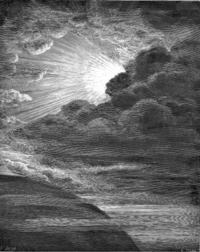Difference between revisions of "Creationism" - New World Encyclopedia
| Line 3: | Line 3: | ||
[[Image:Creation of Light.png|thumb|right|200px|"The Creation of Light" by [[Gustave Doré]].]] | [[Image:Creation of Light.png|thumb|right|200px|"The Creation of Light" by [[Gustave Doré]].]] | ||
| − | Creationism, in its most widely used sense, is the extension of the religious doctrine of [[creation]] to controversies over | + | Creationism, in its most widely used sense, is the extension of the religious doctrine of [[creation]] to controversies over the origin of the universe and of living things. In an unrelated sense, creationism is also a religious doctrine about the origin of the human soul. Both senses are described here. |
| − | In controversies over | + | In modern controversies over cosmic and biological origins, creationism takes two general forms: young-Earth creationism (YEC) and old-Earth creationism (OEC). The former interprets Genesis to mean that God created the universe and the basic kinds of living things in six 24-hour days a few thousand years ago; the latter holds that the universe is much older and that God created it and living things through a long process of change. |
Regarding the origin of the human soul, Christian theologians have debated whether it is created directly by God (“creationism”) or produced by human parents (“traducianism”). The former is more consistent with the immaterial and eternal nature of the soul, while the latter is more consistent with the transmission of original sin. | Regarding the origin of the human soul, Christian theologians have debated whether it is created directly by God (“creationism”) or produced by human parents (“traducianism”). The former is more consistent with the immaterial and eternal nature of the soul, while the latter is more consistent with the transmission of original sin. | ||
| Line 100: | Line 100: | ||
* [http://www.talkorigins.org/ TalkOrigins] | * [http://www.talkorigins.org/ TalkOrigins] | ||
* [http://www.pandasthumb.org/ The Panda’s Thumb] | * [http://www.pandasthumb.org/ The Panda’s Thumb] | ||
| − | |||
* [http://www.csicop.org/intelligentdesignwatch/ Creation & Intelligent Design Watch] | * [http://www.csicop.org/intelligentdesignwatch/ Creation & Intelligent Design Watch] | ||
* [http://www.talkreason.org/ Talk Reason] | * [http://www.talkreason.org/ Talk Reason] | ||
Revision as of 00:31, 29 March 2007
Creationism, in its most widely used sense, is the extension of the religious doctrine of creation to controversies over the origin of the universe and of living things. In an unrelated sense, creationism is also a religious doctrine about the origin of the human soul. Both senses are described here.
In modern controversies over cosmic and biological origins, creationism takes two general forms: young-Earth creationism (YEC) and old-Earth creationism (OEC). The former interprets Genesis to mean that God created the universe and the basic kinds of living things in six 24-hour days a few thousand years ago; the latter holds that the universe is much older and that God created it and living things through a long process of change.
Regarding the origin of the human soul, Christian theologians have debated whether it is created directly by God (“creationism”) or produced by human parents (“traducianism”). The former is more consistent with the immaterial and eternal nature of the soul, while the latter is more consistent with the transmission of original sin.
Young-Earth Creationism
Old-Earth Creationism
Origin of the Soul
ReferencesISBN links support NWE through referral fees
Select Bibliography
Pro-YEC Books
L. Brand and D. C. James. 2005. Beginnings: Are Science and Scripture Partners in the Search for Origins? (Nampa, ID: Pacific Press Publishing.) ISBN 0-816-32144-2.
H. G. Coffin, R. H. Brown, and R. J. Gibson. 2005. Origin by Design. (Hagerstown, MD: Review and Herald Publishing.) ISBN 0-828-01776-X.
D. DeYoung. 2005. Thousands... Not Billions. (Green Forest, AR: Master Books.) ISBN 0-890-51441-0.
J. Perloff. 2002. The Case Against Darwin: Why the Evidence Should Be Examined. (Refuge Books.) ISBN 0-966-81601-3.
J. Sarfati. 2004. Refuting Compromise: A Biblical and Scientific Refutation of 'Progressive Creationism' (Billions of Years) as popularized by Astronomer Hugh Ross. (Green Forest, AR: Master Books.) ISBN 0-890-51411-9.
K. P. Wise. 2002. Faith, Form, and Time: What the Bible Teaches and Science Confirms About Creation and the Age of the Universe. (Nashville, TN: Broadman & Holman.) ISBN 0-805-42462-1.
Pro-OEC Books
F. Rana. 2005. Who Was Adam? A Creation Model Approach to the Origin of Man. (Colorado Springs, CO: Navpress Publishing Group.) ISBN 1-576-83577-4.
H. Ross. 2001. The Creator and the Cosmos: How the Latest Scientific Discoveries of the Century Reveal God. (Colorado Springs, CO: Navpress Publishing Group.) ISBN 1-576-83288-0.
H. Ross. 2006. Creation as Science: A Testable Model Approach to End the Creation/Evolution Wars. (Colorado Springs, CO: Navpress Publishing Group.) ISBN 1-576-83578-2.
D. W. Snoke. 2006. A Biblical Case for an Old Earth. (Baker Books.) ISBN 0-801-06619-0.
Anti-Creationist Books
B. J. Alters and S. M. Alters. 2001. Defending Evolution: A Guide to the Creation/Evolution Controversy. (Sudbury, MA: Jones and Bartlett Publishers.) ISBN 0-7637-1118-7.
N. Eldredge. 2001. The Triumph of Evolution and the Failure of Creationism. (New York: Owl Books.) ISBN 0-8050-7147-4.
R. L. Numbers. 2006. The Creationists: From Scientific Creationism to Intelligent Design. Expanded Edition. (Cambridge. MA: Harvard University Press.) ISBN 0-674-02339-0.
M. Pigliucci. 2002. Denying Evolution: Creationism, Scientism, and the Nature of Science. (Sunderland, MA: Sinauer Associates.) ISBN 0-87893-659-9.
M. Ruse. 2005. The Evolution-Creation Struggle. (Cambridge, MA: Harvard University Press.) ISBN 0-674-01687-4.
E. C. Scott. 2004. Evolution vs. Creationism: An Introduction. (Berkeley, CA: University of California Press.) ISBN 0-520-24650-0.
External links
Pro-YEC Internet Sites
- Institute for Creation Research
- Answers in Genesis
- Creation Research Society
- The True.Origin Archive
- Creation Moments
- Creation Ministries International
- Midwest Creation Fellowship
- Geoscience Research Institute
